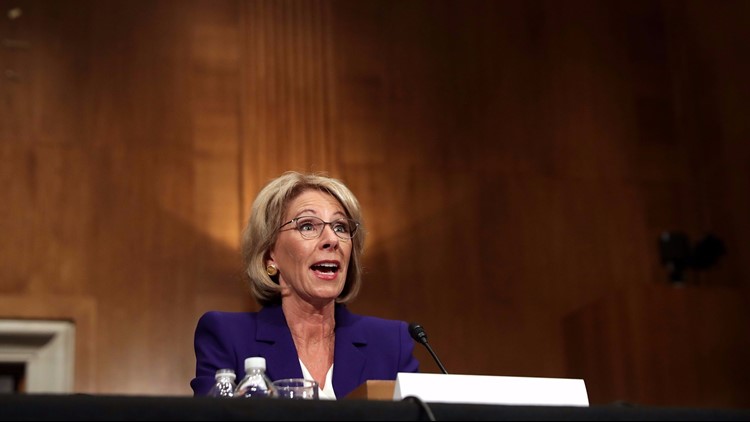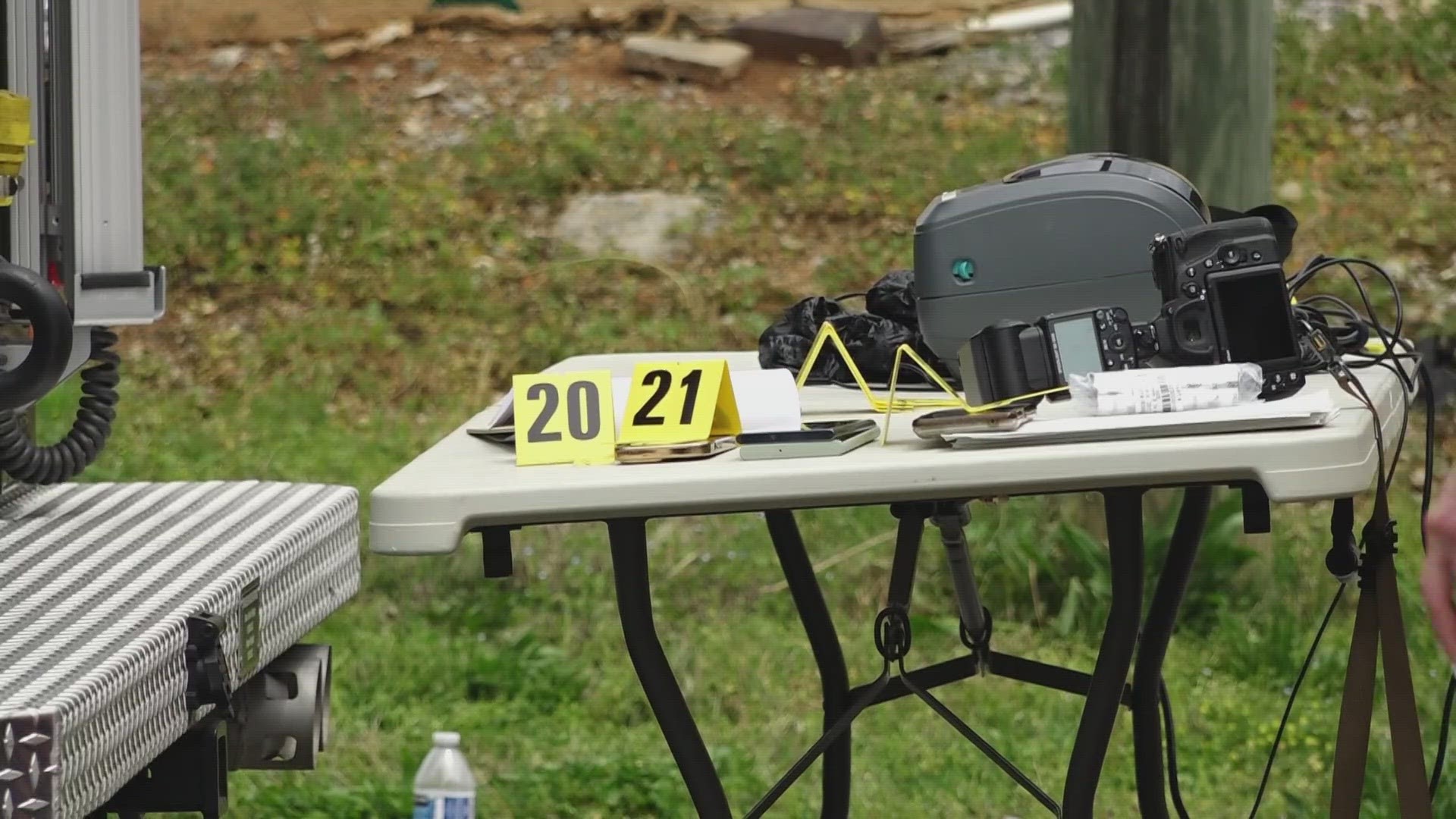Betsy DeVos, a Michigan advocate for school choice and vouchers and President-elect Donald Trump’s nominee for education secretary, vowed Tuesday to protect any schools – public, private or otherwise – as long as they are working for students and parents and serving their needs.
Facing Democrats who questioned DeVos’ support of school choice and what it may mean for public schools, DeVos said she supports “any great school” – including public schools and those beyond what “the (public school) system thinks is best for kids to what moms and dads want, expect and deserve.”
“Not all schools are working for the students that are assigned to them. I’m hoping we can work together to find common ground,” DeVos said, rebuffing a request by U.S. Sen. Patty Murray, D-Wash., that she vow not to propose funding cuts for any public schools.
DeVos, 59, stepped before the Senate Health, Education, Labor and Pensions Committee for a rare nighttime confirmation hearing, facing a broad spectrum of questions that ranged from early childhood education, free college and the Obama administration’s crackdown on college sexual assaults to her own personal beliefs about sexual orientation and any support she gave for controversial “conversion therapy,” which she denied.
“I believe in equality and I firmly believe in the intrinsic value of each individual, and that every student should have the assurance of a safe and discrimination-free place to become educated,” said DeVos, telling U.S. Sen. Tammy Baldwin, D-Wis., that as regards the alleged support, she might “be confusing some other family members in some of those contributions, and also looking at contributions from 18 or 20 years ago.”
“As a mom I just can’t imagine having a child that would feel discriminated against for any reason, and I would want my child in a safe environment,” she said. She acknowledged, however, that her family may have given as much as $200 million to Republican candidates and causes over the years.
In response to questions, she also promised that neither she nor her husband, former Amway head and heir Dick DeVos, would be politically active while she serves, if she is confirmed. She also said that given her family’s complex financial arrangements, she will resolve any conflicts of interest. “I will not be conflicted,” she said.
She also defended her support of charter schools and school choice in Detroit, saying there is “a lot that has gone right in Detroit” given the poverty there and rebuking reports that charter schools haven’t delivered as big a change in education in the city as promised.
While Democrats went on the attack, Republicans on the committee lined up to defend her: The chairman, Sen. Lamar Alexander, R-Tenn., opened the hearing with a strong endorsement, saying, “Betsy DeVos in my opinion is on our children’s side … I believe she’s in the mainstream of public opinion and her critics are not.” He went onto say she has fought to help low-income parents have choice in education options and that 73% of Americans support school choice
Told by DeVos that she supports public education, U.S. Sen. Bill Cassidy, R-La., said, “Man that’s amazing, you would think some would have us think you do not.”
DeVos came into the confirmation hearing a week after it had initially been scheduled and three days before Trump’s inauguration at the U.S. Capitol. Democrats, teachers’ unions and others have loudly denounced DeVos’ nomination, arguing that her vocal support of vouchers and school choice programs could undermine public schools.
“Betsy DeVos is a billionaire who has spent her career & fortune rigging the system to privatize and defund public ed,” Randi Weingarten, head of the 1.6-million-member American Federation of Teachers union in a tweet earlier today.
Alexander said the committee could vote on DeVos’ nomination as early as next Tuesday, after which it would be sent to the floor of the U.S. Senate for final confirmation. Murray, the top Democrat on the panel, complained that the hearing should have been delayed until the Office of Government Ethics sent a letter on DeVos and any agreements she will make to ensure there are no conflicts of interest.
Democrats, who have little chance of blocking DeVos’ nomination, still put up strong resistance at Tuesday’s hearing. Sen. Elizabeth Warren, D-Mass., tried to pin DeVos on a commitment to enforce employment rules at for-profit institutions; Sen. Bernie Sanders, I-Vt., urged DeVos to embrace free tuition at all public colleges and universities, which she called “a really interesting idea” but said policy makers have to “consider that in life nothing is truly free, somebody will pay for it.”
She also declined to vow to keep in place Obama administration rules requiring colleges and universities to be more responsible for cracking down on sexual assaults, saying she needs to look at them. “Sexual assault anywhere and any place is a problem,” she said. Pushed by Sen. Chris Murphy, D-Conn., to say whether guns belong in schools, DeVos said it’s an issue “best left to locales and states to decide.”
She added that for a school in a place like rural Idaho, educators might need “a gun in the school to protect from potential grizzlies.”
Protesters, many of them from Michigan, attended the hearing, filling up a hallway outside the packed committee room. Among them was 17-year-old Dannah Wilson, who had ridden one of two buses from Detroit the night before with about 120 other people. Wilson, a senior at Cornerstone Leadership and Business High School, a Detroit private school, said she’d come “representing students across Detroit. I just honestly want to know how she feels and responds to these questions.”
Wilson said her mother pays $11,000 for her and each of her two younger sisters to attend the school.
Wilson’s mother, Dawn Wilson-Clark, said her five children have attended some 22 Detroit schools in all. “Choice is not the issue,” she said. “The issue is quality. We have a lot of choices, but they’re not quality and the charter schools are not held to the same accountability that the public schools are.” At one point last year, Wilson-Clark said, she was driving 200 miles a week to four different schools “trying to get my children a quality education.”
Shoniqua Kemp, another Detroit parent with the 482 Forward education organizing network, said “quality is a problem” in Detroit schools, even with a wide array of choices.
“School choices can be a good thing – however, give me quality. My choice shouldn’t be ‘Rancid tomato’ or ‘Pick one from the garbage.’ That’s not fair.”
DeVos came into the hearing with many supporters. Writing in the Detroit News today, Michigan Gov. Rick Snyder praised her selection, saying she “has a big heart and she believes strongly that parental control of education through school choice is integral to improving the performance of our K-12 system.”
“Contrary to the misleading picture the teachers unions are trying to paint, she shares her support for school choice with several fair-minded and prominent Democrats, including Barack Obama’s two education secretaries, John King and Arne Duncan,” Snyder wrote.
Several school reformers, including political rivals of Trump’s, have praised DeVos. Former Florida Gov. Jeb Bush called her "an outstanding pick,” saying her allegiance “is to families, particularly those struggling at the bottom of the economic ladder, not to an outdated public education model that has failed them from one generation to the next."
“All in all, she’s a pretty conventional choice,” said Rick Hess, director of education policy studies at the American Enterprise Institute, a right-leaning Washington think tank.
Hess noted last month that President Obama’s 2015 nomination of King, then New York’s education commissioner, “was greeted courteously and approved rapidly” by the Republican-controlled Senate, despite King’s “troubled tenure in New York, one that featured a disastrous rollout of the Common Core.”
But while school choice advocates say DeVos’s efforts have largely succeeded, others say her work in Michigan has brought disappointing, sometimes chaotic results.
The DeVoses have long sought to bring more private competition to the public school system. In 2000, the couple led a failed petition drive to institute a voucher system in Michigan that would allow parents to use public money to send their children to private schools. The state constitution prohibits such use of public funds.
http://www.freep.com/story/news/politics/2016/11/23/betsy-devos-education-secretary-trump/94373904/
Voters overwhelmingly rejected the proposal. But a similar plan is the centerpiece of Trump's education plan. He wants to spend $20 billion in federal funding now being spent on other things — and expects states to kick in even more — to provide to pay $12,000 in private school tuition for every high-poverty child in the country.
The couple also played a role in getting Michigan’s charter school law passed in 1993, and ever since have worked to protect charters from additional regulation. When Michigan lawmakers in 2016 were considering a measure that would have added oversight for charter schools in Detroit, members of the DeVos family poured $1.45 million into legislators’ campaign coffers — an average of $25,000 a day for seven weeks. Oversight was not included in the final legislation.
As a result, Michigan’s charter sector is among the least regulated in the country. About 80% of charters in Michigan are run by private companies, far more than in any other state.
The National Association of Charter School Authorizers has said Michigan is well below average in the number of underperforming charter schools that close, and Douglas Harris, a professor of economics at Tulane University, last November called DeVos’ appointment a “triumph of ideology over evidence,” saying that as one of the architects of Detroit’s charter school system, she holds partial responsibility for what even charter school backers acknowledge is “the biggest school reform disaster in the country.”
Michigan's charter-friendly policies have allowed nearly 100 schools to open, run mostly by for-profit charter-school-management organizations. That has given families wider choice over their children's schools, but it has also created an expensive oversupply of about 30,000 seats in city classrooms.
Current U.S. Education Secretary John King, who cut his teeth teaching in and founding charter schools in Massachusetts, last week noted that Michigan’s weak charter school law has brought “a proliferation of” low-performing schools. “In Michigan, I do think the lack of strong accountability in their charter law, and in their charter sector, has harmed public education generally, and has harmed, ultimately, students,” he said.
Spangler reports for the Detroit Free Press.



